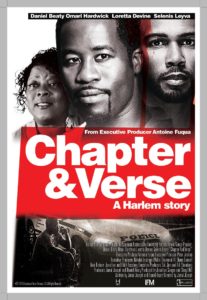
The film is both about identity and race. From a black man getting out of prison to a black man living the white house as president, American society forces you to live with a double consciousness of being black in a country that oppresses people of color.
Rob Perrée in conversation with Jamal Joseph.
An interview with Jamal Joseph, the director of Chapter & Verse
ARTS AND CULTURE CAN BE AS POWERFUL AS A GUN OR A RIFLE
A few weeks ago I saw ‘Chapter & Verse. A Harlem Story’ in Mist, a cultural center in the heart of Harlem. I didn’t know anything about the movie and its director. The movie was recommended by a good friend. ‘Innocent’ I picked a chair in the middle of an almost empty theater. Within a few minutes I was into it completely. A touching story of an ex-prisoner who tries to build up a new life in his former neighborhood. His struggle seems endless. He meets an older woman and becomes the protégé of her grandson. Slowly he frees him from the gang he is a member of. Without giving away the complete story I can say that grandson and protégé pay the price at the end. Gangs have their rules.
The movie gives an authentic picture of Harlem, of life in Harlem, of hopeless situations and circumstances that never seem to change there. The acting is amazing and very convincing. If so, why was the room almost empty? Why couldn’t I watch this movie in movie theaters in the city?
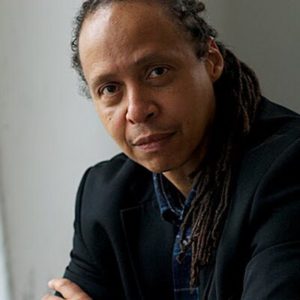
I wanted to interview the director Jamal Joseph, an American writer, producer, poet, activist, and educator. He was the youngest member of the Black Panthers. He was in prison for more than 5 years. Joseph used his time in Leavenworth very well: he earned two college degrees. Now he is a full professor at Columbia University.
Because it was difficult to set a date – I was leaving in 2 days – we decided to go for and email interview.
.
Rob
Why is your film not in all movie theaters, like Moonlight, Hidden Figures and Get Out?
Jamal
It is generally hard for black indie films to get distribution. Studios that we talk to didn’t see how a film about a marginalized human being coming out of prison to rebuild his life could capture the attention of audiences. We’re encouraged by the good reviews and strong audience reactions and trying to build on that success to get wider distribution.
.
Rob
So you pay the price for a film that does not give a ‘beautiful picture’ of the US, is not like Hollywood and does not have a happy end?
Jamal
Yes. the fact that we do an unflinching portrayal of life in the inner-city and a stern ending that more accurately reflects what poverty and the American criminal justice system does to black and brown men has made it more difficult to get mass distribution.
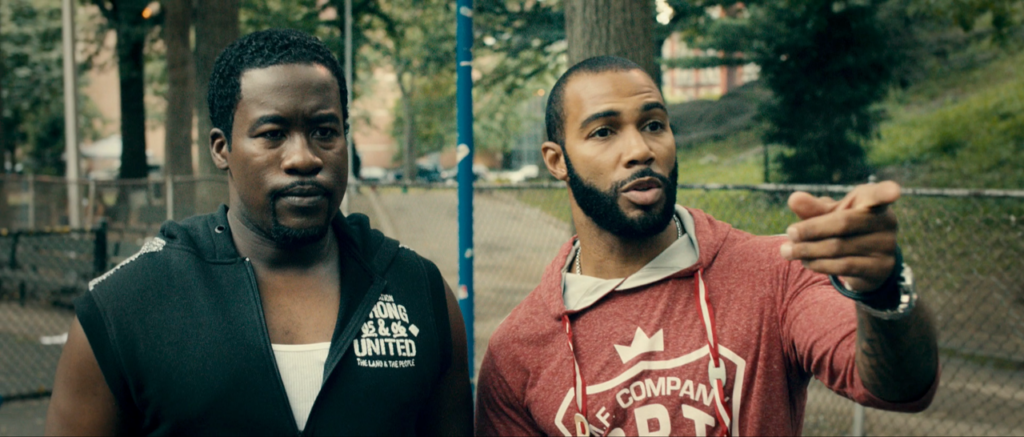
Still from Chapter & Verse.
Rob
The acting was amazing; not only Daniel Beaty and Loretta Divine, also the street kids and a lot of other supporting roles were very natural. Is it your way of directing, is it their involvement in the project or are they just great actors?
Jamal
The performances in the film were true partnerships in terms of letting talented actors and non-actors be natural on screen, and hopefully my ability as a director to communicate the ideas to actors based on who we believed the characters were and the living truths of what we were trying to communicate.
.
Rob
Was I experiencing your personal life watching the movie?
Jamal
A lot of my personal experiences were channeled in the film: Lance’s conflict with his parole officer; his challenges in dealing with the street gang in his neighborhood are some examples. Other experiences such as Lance’s struggle with his homeless father didn’t happen to me directly but did happen to men I knew.
.
Rob
For me it was a plus to watch your film in a theater in Harlem. Do you think that the context has a big influence on one’s perception?
Jamal
We’ve been pleased that the film has resonated with audiences in inner-cities in Chicago, LA and Atlanta but also with white audiences at places like Lincoln Center and the Human Rights Watch in Chicago. White audience members have commented that watching the film allowed them to experience what it must be like to live in communities like Harlem.
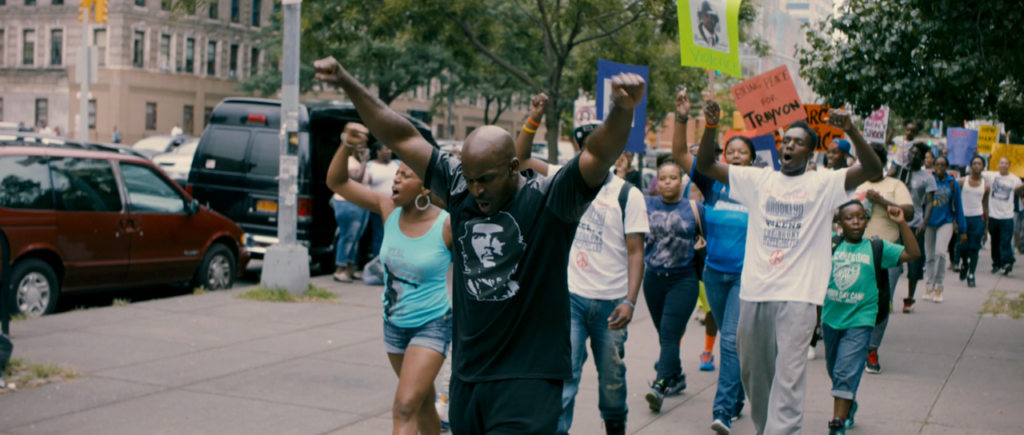
Still from Chapter & Verse.
Rob
Did you make your movie with a certain audience in mind?
Jamal
I always felt that if I made a film that was truthful that it would connect with audiences around the world in the same way that good foreign films that have interesting stories and powerful characters connect with American audiences.
.
Rob
Is your film about identity or about race?
Jamal
The film is both about identity and race. From a black man getting out of prison to a black man living the white house as president, American society forces you to live with a double consciousness of being black in a country that oppresses people of color.
.
Rob
You know how to tell a story. Is storytelling an important aspect of making this movie or a movie?
Jamal
From the time that people sat around fires at the dawn of civilization to sitting around television sets in their living room, storytelling has been a way for us to connect with our inner feelings of love, despair, hopes and dreams.
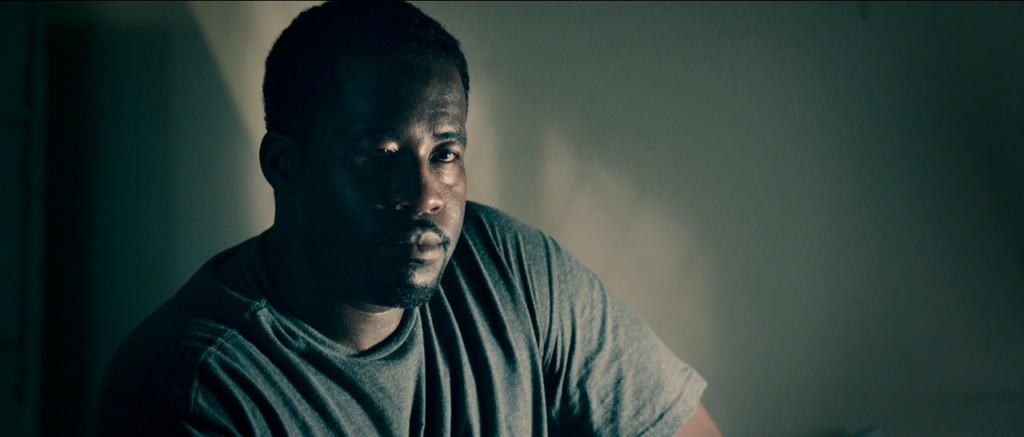
Still from Chapter & Verse..
Rob
Is storytelling a natural quality in African-American culture?
Jamal
African-Americans use storytelling for more than just entertainment. They become reminders of the past, hope for the present, and calls to awareness and action for the future.
.
Rob
In an interview I have read you mention the poet and writer Langston Hughes as a reference. Can you explain that?
Jamal
Langston Hughes saw the black experience as musical notes for a lifelong symphony he composed about the disappointments, celebrations, fears and hopes of black people. He never felt that he had to look any further to find his stories. The black community was his muse. I have the same sense of inspiration about where my stories come from.
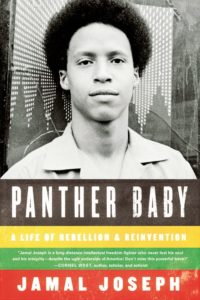
Rob
What is the difference between the ‘Panther Baby’ of the past and the artist/director/poet/professor of the present?
Jamal
The ‘Panther Baby’ of the past felt that armed revolution might be the only way to end oppression and to liberate black people. The artist/educator/revolutionary of the present feels that education, arts and culture can be just as powerful as a gun or a rifle.
.
Rob
Somewhere I’ve read that prison has been the university for many black men. Is that still true?
Jamal
Malcolm X, who was self-educated in prison, is the one who spoke and wrote those words. Whether self-educated or if one is fortunate enough to be in a prison that has education programs, many black prisoners come to understand that they can liberate themselves through knowledge. It costs $250,000 to keep someone in prison, and $60,000 a year to send someone to Harvard. One would hope that those in power would understand that education and job training is the best way to break the cycle of poverty, oppression and crime.
.
Rob
Why did you choose for film as your main medium?
Jamal
I have strong roots in theater but film has the ability to reach thousands and perhaps millions of people and can be preserved for generations.
.
Rob
You make fiction movies and documentaries. That is pretty rare. Obviously not for you.
Jamal
I am first and foremost a storyteller, so when I find a story or a story finds me, I try to embrace the form. Be it documentary, fiction film, book, poetry or music that I hope can best tell that particular story.
.
Rob
Did teaching change your opinion about the role and the function of art, of film?
Jamal
I grew up in the black arts movement which was an extension of the Black Power movement, and was surrounded by amazing art created by people like Sonia Sanchez, Amiri Baraka, the Last Poets, Negro Ensemble Company, etc. In fact one of the slogans of the Black Panther Party was “the only culture worth keeping is a revolutionary culture.” So I understood, even as a “baby Panther” how power and important art was in raising revolutionary consciousness.
.
Rob
What is the difference for a man of art and culture between living ‘under’ Obama and living ‘under ‘Trump?
Jamal
Living under Obama, the challenge was using the arts to make people understand that there were still problems and battles to be fought even though we had a black president. The challenge under Trump is to find the resources to tell these stories and to let people know that there is hope for liberation even under a mega oppressive regime.
.
